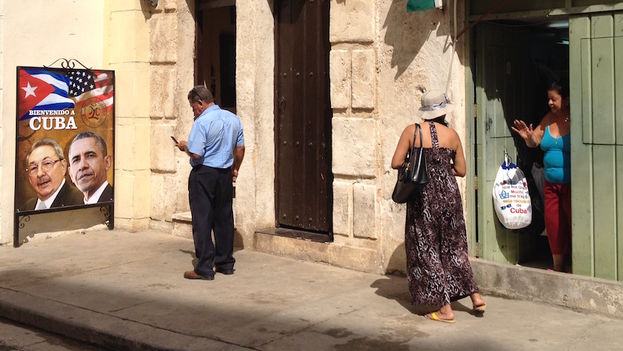
![]() 14ymedio, Yoani Sanchez, Generation Y, Havana, 20 March 2016 – He arrives on the Island on Palm Sunday, will attend a baseball game, and has already spoken by phone with the most popular humorist on the Island. Barack Obama’s plane has not yet landed and already he has stolen the hearts of a legion of admirers through a series of symbols. A meal in a paladar (a private restaurant), a phrase from José Martí in his major speech, and a mention of Cachita, the Virgin of Charity of Cobre, would complete his upcoming gestures of enchantment.
14ymedio, Yoani Sanchez, Generation Y, Havana, 20 March 2016 – He arrives on the Island on Palm Sunday, will attend a baseball game, and has already spoken by phone with the most popular humorist on the Island. Barack Obama’s plane has not yet landed and already he has stolen the hearts of a legion of admirers through a series of symbols. A meal in a paladar (a private restaurant), a phrase from José Martí in his major speech, and a mention of Cachita, the Virgin of Charity of Cobre, would complete his upcoming gestures of enchantment.
On Saturday night Cuban TV broadcast a video in which the humorist Pánfilo called the White House to talk to the president of the United States himself. A masterstroke of the Obama administration, it thus placed itself miles away from Cuba’s powers-that-be, who lack any talent for laughter. Through the character of this old man who is obsessed with his ration book, the president of the United States addressed the Cuban people and did so in their own language.
This morning, for a few hours, people will put aside conversations about high food prices and complaints about the collapse of transportation, aggravated by the security measures that plague the city. On the streets there is a resurgence of jokes starring Pepito, the mischievous child of our folktales, who emerged from his long silence to laugh even about the great visitor’s mother-in-law.
Symbols are a part of Obama. For black and mixed-race Cubans his coming is a reminder of how remote the arrival of the Cuban president seems to some of them. Cuba’s historic generation, white and rancid, has ruled for more than half a century over the destiny of a people whose skin tones span the racial spectrum. In the poorest neighborhoods, the occupant of the White House has many fans, and in those same areas the popularity of the Plaza of the Revolution is taking a nose-dive.
The man who today will descend the airplane stairs with a firm step, trotting as usual, will present a strong contrast to the gerontocracy that dominates Cuba. In a country with a serious demographic problem, where the majority of young people dream of emigrating, this leader born after the events of the Bay of Pigs is read like fresh page in a history book with too many volumes dedicated to the past.
He is also coming, with his family, to a nation where we never knew who Fidel Castro was married to and where, for decades, his children were never officially presented in public. He will visit the cathedral in Havana and for his major speech on Tuesday they have chosen a historic theater, one of the few places on the island where ideology has not been able to remove its purely cultural connotations.
However, with each symbolic chord Obama touches in the popular imagination, he assumes a responsibility. The expectations are overflowing because Cubans want to cling to any hope that makes them believe the future will be better. The dreams of economic relief, the end of food shortages and improvements in the country’s infrastructure, are at their highest point this Sunday but have a short expiration date.
People want Saint Obama to work miracles. They have placed candles on his altar and said a prayer that he will bring them the prosperity promised by others for more than half a century. For many families, the most anticipated marvel is summarized in it being easier to get a plate a food, a desire expressed in the street with every possible rhyme that joins Obama’s name and the popular word for food: jama.
Thousands of parents across the country are putting on the shoulders of the visitor the responsibility of convincing their children not to leave on the rafts of despair. They believe that he will be able to stop this incessant flow that is bleeding the country, if only he manages to persuade them that a new Cuba is just around the corner. For the nine migrants who just died trying to cross the Straits of Florida, it is a chance that comes too late.
The marvel others are expecting from Obama is connectivity, as if in Air Force One the United States president will have brought the fiber optic cable that will lift the Island from the precarious state of its internet access. The man who has used social networks intensively in his political career is seen as someone who can do a great deal to sneak Cubans into cyberspace.
In the prisons, thousands are waiting for the president of the United States to achieve an amnesty. Opponents of the current government project major openings in political spaces and room for expression. In the hospitals, patients await the arrival of resources to upgrade deteriorating emergency rooms, and in the Cuban countryside expectation of access to machinery and seeds bears the face of Uncle Sam.
Obama arrives in Havana on the first day of Holy Week. Awaiting him is the glory of his popularity and the cross of excessive hopes.
